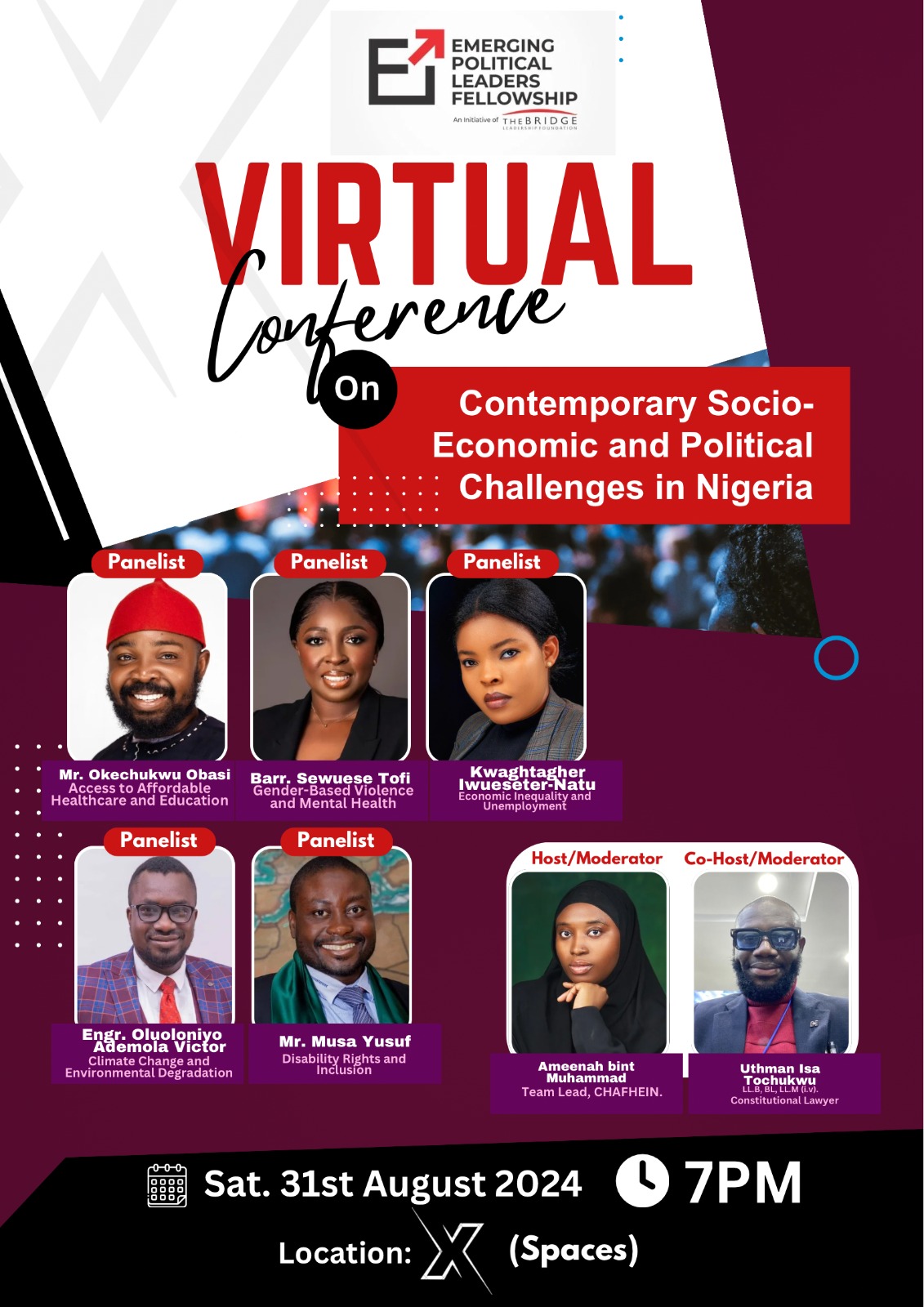In fulfillment of their civic engagement requirement, Kwaghtagher Iwueseter-Natu, Ademola Oluoloniyo, Okechukwu Obasi, and Sewuese Tofi organized a virtual conference on August 30, 2024. This conference aimed to address key socio-political, economic, and social challenges. Enlisting the help of two external moderators, the group provided a platform for discussing solutions and suggestions to pressing global issues. Despite challenges in promoting the event, the conference attracted over 30 participants who engaged in meaningful dialogue on the current socio-economic landscape.
Core Objectives
The primary goals of the conference were to:
- Analyze and provide solutions to pressing contemporary socio-political and economic issues.
- Examine the underlying causes of hunger and bad governance protests within the country.
Key Outcomes:
One of the key objectives was to help fellows develop their presentation and public speaking skills while enhancing their capacity to deliver informative lectures. This objective was achieved as participants effectively communicated and disseminated their knowledge, demonstrating improved confidence in public engagement.
Notable highlights from the conference included:
Meaningful discussions on economic inequality, unemployment, climate change, disability inclusion, and gender-based violence.
Kwaghtagher Iwueseter-Natu delivered an impactful presentation on economic inequality and unemployment, emphasizing how both issues are intertwined. She called for increased investment in SMEs to address the inequality gap and promote sustainable economic growth.
Ademola Oluoloniyo presented on climate change and environmental degradation, providing a detailed overview of global warming and the deteriorating health of the planet. He highlighted the urgency of global action to mitigate environmental damage and protect our ecosystems.
Musa Abdullahi gave a passionate lecture on disability rights and inclusion, advocating for stronger policies that create inclusive environments for disabled individuals. He emphasized that disabilities should not be seen as handicaps but as differences that can be empowered through proper support and advocacy.
Okechukwu Collins addressed the critical issue of access to affordable healthcare and education, underscoring the struggles faced by marginalized communities. He advocated for increased budgetary allocations to these sectors, stressing that a healthy and educated population is essential for sustainable development.
Barr. Sewuese Tofi led an insightful discussion on gender-based violence and mental health, highlighting the systemic issues that perpetuate violence and the mental health consequences faced by survivors. She called for stronger legal frameworks and mental health services to support survivors and break the cycle of abuse.
The exchange of innovative ideas and solutions aimed at fostering a more equitable and sustainable society.
Lessons Learned and Recommendations
- The conference shed light on critical socio-political and economic challenges, offering insights into potential solutions. Some key lessons learned include:
- Economic inequality and unemployment are deeply interconnected, and addressing one requires tackling the other. Investing in Small and Medium Enterprises (SMEs) can help bridge the economic gap.
- Inclusive policies for disabled individuals must be prioritized to empower their participation in society.
- Environmental sustainability requires coordinated global action to mitigate climate change and protect ecosystems.
- Increasing budget allocations for healthcare and education in underserved areas is crucial to achieving sustainable development.
- Mental health support plays a vital role in addressing gender-based violence, and systemic failures must be tackled to protect survivors.
To achieve meaningful progress, it is recommended that governments and stakeholders focus on creating inclusive policies, investing in infrastructure, and allocating adequate resources to tackle these pressing issues.
Way Forward: Next Steps
The group remains committed to advocating for these issues and will continue their civic engagement efforts. They plan to follow up on the recommendations discussed during the conference and work with stakeholders to implement targeted solutions to the challenges identified. Continued advocacy, policy recommendations, and collaborative actions will be key to creating a more just and sustainable future.

